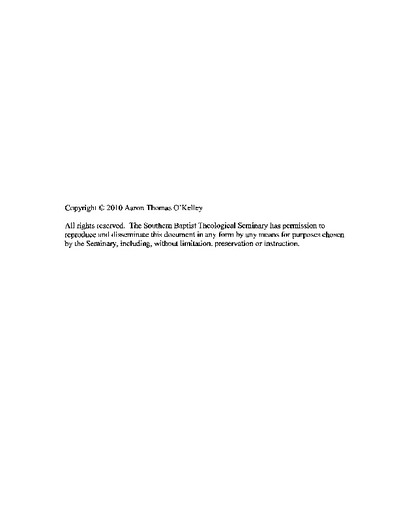A Historical-Theological Critique of the New Perspective on Paul
Abstract
This dissertation argues that the new perspective on Paul rests on a faulty
heremeneutical presupposition. This presupposition is that covenantal nomism (as
advocated by E. P. Sanders as a proper conception of Second Temple Judaism) could not
have served as a foil for Paul in the development of a doctrine of justification that
resembles that of the Reformation. The presupposition is faulty because Sanders's
portrayal of Judaism as grace-based has no bearing on the categories that defined the
shape of the doctrine of justification during the Reformation period and beyond. The
study neither accepts nor rejects Sanders's portrayal of Judaism. Instead, it accepts
Sanders's claim for the sake of argument and then demonstrates that his claim does not
warrant a radical revision of the Reformation approach to the Pauline writings.
Chapter 1 demonstrates the strong dependence of the new perspective on
Sanders's work and the hermeneutical presupposition that his work Paul and Palestinian
Judaism has generated.
Chapter 2 sets the historical-theological background for the thesis by surveying
important works in the pre-Reformation Catholic scholastic period, as well as the decree
of the Council of Trent on justification, in order to demonstrate that, much like
covenantal nomism, the emerging Roman Catholicism of the late medieval and
Reformation periods was a grace-based, yet monocovenantal, religion.
Chapter 3 surveys the works of three prominent Reformers-Martin Luther,
Philip Melanchthon, and John Calvin-in order to demonstrate that what defines the
Reformation doctrine of justification is not grace per se but rather a doctrine of alien
righteousness, situated within a bicovenantal framework, in which there is an
uncompromising divine demand for perfect obedience.
Chapter 4 traces the same themes-perfect obedience, bicovenantalism, and
alien righteousness-into the post-Reformation period in order to demonstrate that these
are the categories that define the "old perspective" on Paul.
Chapter 5 summarizes the foregoing observations, argues that the new
perspective's hermeneutical presupposition is unwarranted, and then concludes with
exegetical observations that demonstrate a bicovenantal theology in Paul that is similar to
that of the Reformation doctrine of justification, one that could have easily arisen in the
context of a prevailing covenantal nomism.

